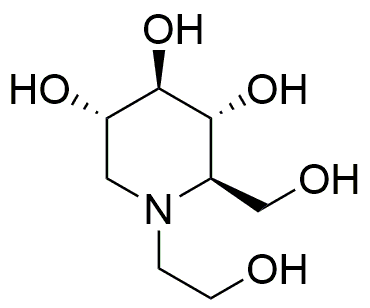Miglitol is widely utilized in research focused on:
- Diabetes Management: As an alpha-glucosidase inhibitor, it helps control blood sugar levels by slowing carbohydrate absorption in the intestines, making it a valuable option for Type 2 diabetes patients.
- Pharmaceutical Formulations: Used in the development of oral medications, it enhances the efficacy of antidiabetic drugs, providing a synergistic effect that can improve patient outcomes.
- Clinical Research: Investigated in various studies for its potential benefits in combination therapies, helping researchers explore new treatment protocols for diabetes and metabolic disorders.
- Food Industry: Its properties are being studied for potential applications in functional foods aimed at glycemic control, appealing to health-conscious consumers.
- Patient Education: As part of diabetes management programs, it serves as a key educational tool, helping patients understand the importance of carbohydrate management in their diets.
General Information
Properties
Safety and Regulations
Applications
Miglitol is widely utilized in research focused on:
- Diabetes Management: As an alpha-glucosidase inhibitor, it helps control blood sugar levels by slowing carbohydrate absorption in the intestines, making it a valuable option for Type 2 diabetes patients.
- Pharmaceutical Formulations: Used in the development of oral medications, it enhances the efficacy of antidiabetic drugs, providing a synergistic effect that can improve patient outcomes.
- Clinical Research: Investigated in various studies for its potential benefits in combination therapies, helping researchers explore new treatment protocols for diabetes and metabolic disorders.
- Food Industry: Its properties are being studied for potential applications in functional foods aimed at glycemic control, appealing to health-conscious consumers.
- Patient Education: As part of diabetes management programs, it serves as a key educational tool, helping patients understand the importance of carbohydrate management in their diets.
Documents
Safety Data Sheets (SDS)
The SDS provides comprehensive safety information on handling, storage, and disposal of the product.
Product Specification (PS)
The PS provides a comprehensive breakdown of the product’s properties, including chemical composition, physical state, purity, and storage requirements. It also details acceptable quality ranges and the product's intended applications.
Certificates of Analysis (COA)
Search for Certificates of Analysis (COA) by entering the products Lot Number. Lot and Batch Numbers can be found on a product’s label following the words ‘Lot’ or ‘Batch’.
Numéro de catalogue
Numéro de lot/série
Certificates Of Origin (COO)
This COO confirms the country where the product was manufactured, and also details the materials and components used in it and whether it is derived from natural, synthetic, or other specific sources. This certificate may be required for customs, trade, and regulatory compliance.
Numéro de catalogue
Numéro de lot/série
Safety Data Sheets (SDS)
The SDS provides comprehensive safety information on handling, storage, and disposal of the product.
DownloadProduct Specification (PS)
The PS provides a comprehensive breakdown of the product’s properties, including chemical composition, physical state, purity, and storage requirements. It also details acceptable quality ranges and the product's intended applications.
DownloadCertificates of Analysis (COA)
Search for Certificates of Analysis (COA) by entering the products Lot Number. Lot and Batch Numbers can be found on a product’s label following the words ‘Lot’ or ‘Batch’.
Numéro de catalogue
Numéro de lot/série
Certificates Of Origin (COO)
This COO confirms the country where the product was manufactured, and also details the materials and components used in it and whether it is derived from natural, synthetic, or other specific sources. This certificate may be required for customs, trade, and regulatory compliance.


